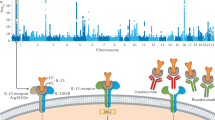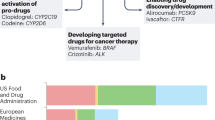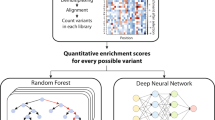Abstract
Genome-wide association studies (GWAS) of responses to drugs, including clopidogrel, pegylated-interferon and carbamazepine, have led to the identification of specific patient subgroups that benefit from therapy. However, the identification and replication of common sequence variants that are associated with either efficacy or safety for most prescription medications at odds ratios (ORs) >3.0 (equivalent to >300% increased efficacy or safety) has yet to be translated to clinical practice. Although some of the studies have been completed, the results have not been incorporated into therapy, and a large number of commonly used medications have not been subject to proper pharmacogenomic analysis. Adoption of GWAS, exome or whole genome sequencing by drug development and treatment programs is the most striking near-term opportunity for improving the drug candidate pipeline and boosting the efficacy of medications already in use.
This is a preview of subscription content, access via your institution
Access options
Subscribe to this journal
Receive 12 print issues and online access
$209.00 per year
only $17.42 per issue
Buy this article
- Purchase on Springer Link
- Instant access to full article PDF
Prices may be subject to local taxes which are calculated during checkout


Similar content being viewed by others
Change history
07 December 2012
In the version of this article initially published online and in print, the funders were not acknowledged. The funding statement should have read 'EJT was funded by NIH/NCATS TR000109'. The errors have been corrected in the HTML and PDF versions of the article.
References
Allison, M. Reinventing clinical trials. Nat. Biotechnol. 30, 41–49 (2012).
Mullard, A. Partnering between pharma peers on the rise. Nat. Rev. Drug Discov. 10, 561–562 (2011).
Norman, T.C., Bountra, C., Edwards, A.M., Yamamoto, K.R. & Friend, S.H. Leveraging crowdsourcing to facilitate the discovery of new medicines. Sci. Transl. Med. 3, 88mr1 (2011).
Pollack, A. Drug makers join efforts in research. The New York Times, B3 (2012).
Hindorff, L.A. et al. A catalog of published genome-wide association studies. http://www.genome.gov/gwastudies (accessed 22 October 2012)
Giacomini, K.M. et al. Pharmacogenomics and patient care: one size does not fit all. Sci Transl Med 4, 153ps118 (2012).
Pirmohamed, M. Pharmacogenetics: past, present and future. Drug Discov. Today 16, 852–861 (2011).
Nelson, M.R. et al. An abundance of rare functional variants in 202 drug target genes sequenced in 14,002 people. Science 337, 100–104 (2012).
Ramirez, A.H. et al. Novel rare variants in congenital cardiac arrhythmia genes are frequent in drug-induced torsades de pointes. Pharmacogenomics J. advance online publication, doi:10.1038/tpj.2012.14 (15 May 2012).
Rosen, H.R. Chronic hepatitis C infection. N. Engl. J. Med. 364, 2429–2438 (2011).
Soriano, V. et al. Pharmacogenetics of hepatitis C. J. Antimicrob. Chemother. 67, 523–529 (2012).
McHutchison, J.G. et al. Peginterferon alfa-2b or alfa-2a with ribavirin for treatment of hepatitis C infection. N. Engl. J. Med. 361, 580–593 (2009).
Ge, D. et al. Genetic variation in IL28B predicts hepatitis C treatment-induced viral clearance. Nature 461, 399–401 (2009).
Tanaka, Y. et al. Genome-wide association of IL28B with response to pegylated interferon-alpha and ribavirin therapy for chronic hepatitis C. Nat. Genet. 41, 1105–1109 (2009).
Suppiah, V. et al. IL28B is associated with response to chronic hepatitis C interferon-alpha and ribavirin therapy. Nat. Genet. 41, 1100–1104 (2009).
Rauch, A. et al. Genetic variation in IL28B is associated with chronic hepatitis C and treatment failure: a genome-wide association study. Gastroenterology 138, 1338–1345, 1345 e1331–1337 (2010).
Veldt, B.J. et al. Recipient IL28B polymorphism is an important independent predictor of posttransplant diabetes mellitus in liver transplant patients with chronic hepatitis C. Am. J. Transplant. 12, 737–744 (2012).
Clark, P.J., Thompson, A.J. & McHutchison, J.G. IL28B genomic-based treatment paradigms for patients with chronic hepatitis C infection: the future of personalized HCV therapies. Am. J. Gastroenterol. 106, 38–45 (2011).
Thomas, D.L. et al. Genetic variation in IL28B and spontaneous clearance of hepatitis C virus. Nature 461, 798–801 (2009).
Topol, E.J. & Teirstein, P.S. Textbook of Interventional Cardiology 6th edn. (Elsevier Saunders, 2011).
Shuldiner, A.R. et al. Association of cytochrome P450 2C19 genotype with the antiplatelet effect and clinical efficacy of clopidogrel therapy. J. Am. Med. Assoc. 302, 849–857 (2009).
Mega J.L. et al. Dosing clopidogrel based on cyp2c19 genotype and the effect on platelet reactivity in patients with stable cardiovascular disease. J. Am. Med. Assoc. 306, 2221–2228 (2011).
Roberts, J.D. et al. Point-of-care genetic testing for personalisation of antiplatelet treatment (RAPID GENE): a prospective, randomised, proof-of-concept trial. Lancet 379, 1705–1711 (2012).
Patay, B.A. & Topol, E.J. The unmet need of education in genomic medicine. Am. J. Med. 125, 5–6 (2012).
Moore, T.J., Furberg, C.D. & Cohen, M.R. Anticoagulants the leading reported drug risk in 2011. QuarterWatch, Monitoring FDA MedWatch Reports (Institute for Safe Medication Practices, 2012). http://www.ismp.org/quarterwatch/pdfs/2011Q4.pdf (accessed 22 October 2012)
Klein, T.E. et al. Estimation of the warfarin dose with clinical and pharmacogenetic data. N. Engl. J. Med. 360, 753–764 (2009).
Epstein, R.S. et al. Warfarin genotyping reduces hospitalization rates results from the MM-WES (Medco-Mayo Warfarin Effectiveness study). J. Am. Coll. Cardiol. 55, 2804–2812 (2010).
Anderson, J.L. et al. A randomized and clinical effectiveness trial comparing two pharmacogenetic algorithms and standard care for individualizing warfarin dosing (CoumaGen-II). Circulation 125, 1997–2005 (2012).
Shu, Y. et al. Effect of genetic variation in the organic cation transporter 1, OCT1, on metformin pharmacokinetics. Clin. Pharmacol. Ther. 83, 273–280 (2008).
Zhou, K. et al. Common variants near ATM are associated with glycemic response to metformin in type 2 diabetes. Nat. Genet. 43, 117–120 (2011).
Tantisira, K.G. et al. Genome-wide association identifies the T gene as a novel asthma pharmacogenetic locus. Am. J. Respir. Crit. Care Med. 185, 1286–1291 (2012).
Tantisira, K.G. et al. Genomewide association between GLCCI1 and response to glucocorticoid therapy in asthma. N. Engl. J. Med. 365, 1173–1183 (2011).
Himes, B.E. et al. Genome-Wide Association Analysis in Asthma Subjects Identifies SPATS2L as a Novel Bronchodilator Response Gene. PLoS Genet. 8, e1002824 (2012).
Jonsson, T. et al. A mutation in APP protects against Alzheimer/'s disease and age-related cognitive decline. Nature 488, 96–99 (2012).
Smith, D.A. & Schmid, E.F. Drug withdrawals and the lessons within. Curr. Opin. Drug Discov. Devel. 9, 38–46 (2006).
Lynch, T. & Price, A. The effect of cytochrome P450 metabolism on drug response, interactions, and adverse effects. Am. Fam. Physician 76, 391–396 (2007).
Daly, A.K. Using genome-wide association studies to identify genes important in serious adverse drug reactions. Annu. Rev. Pharmacol. Toxicol. 52, 21–35 (2012).
Lee, W.M. Drug-induced hepatotoxicity. N. Engl. J. Med. 349, 474–485 (2003).
Kindmark, A. et al. Genome-wide pharmacogenetic investigation of a hepatic adverse event without clinical signs of immunopathology suggests an underlying immune pathogenesis. Pharmacogenomics J. 8, 186–195 (2008).
Daly, A.K. et al. HLA-B*5701 genotype is a major determinant of drug-induced liver injury due to flucloxacillin. Nat. Genet. 41, 816–819 (2009).
Lucena, M.I. et al. Susceptibility to amoxicillin-clavulanate-induced liver injury is influenced by multiple HLA class I and II alleles. Gastroenterology 141, 338–347 (2011).
Roujeau, J.C. Clinical heterogeneity of drug hypersensitivity. Toxicology 209, 123–129 (2005).
McCormack, M. et al. HLA-A*3101 and carbamazepine-induced hypersensitivity reactions in Europeans. N. Engl. J. Med. 364, 1134–1143 (2011).
Chen, P. et al. Carbamazepine-induced toxic effects and HLA-B*1502 screening in Taiwan. N. Engl. J. Med. 364, 1126–1133 (2011).
Link, E. et al. SLCO1B1 variants and statin-induced myopathy—a genomewide study. N. Engl. J. Med. 359, 789–799 (2008).
Wilke, R.A. et al. The clinical pharmacogenomics implementation consortium: CPIC guideline for SLCO1B1 and simvastatin-induced myopathy. Clin. Pharmacol. Ther. 92, 112–117 (2012).
Furberg, C.D. & Pitt, B. Withdrawal of cerivastatin from the world market. Curr. Control. Trials Cardiovasc. Med. 2, 205–207 (2001).
Zhang, W., Roederer, M.W., Chen, W.Q., Fan, L. & Zhou, H.H. Pharmacogenetics of drugs withdrawn from the market. Pharmacogenomics 13, 223–231 (2012).
Doshi, P., Jefferson, T. & Del Mar, C. The imperative to share clinical study reports: recommendations from the Tamiflu experience. PLoS Med. 9, e1001201 (2012).
Schnitzer, T.J. et al. Comparison of lumiracoxib with naproxen and ibuprofen in the Therapeutic Arthritis Research and Gastrointestinal Event Trial (TARGET), reduction in ulcer complications: randomised controlled trial. Lancet 364, 665–674 (2004).
Singer, J.B. et al. A genome-wide study identifies HLA alleles associated with lumiracoxib-related liver injury. Nat. Genet. 42, 711–714 (2010).
Aithal, G.P. & Daly, A.K. Preempting and preventing drug-induced liver injury. Nat. Genet. 42, 650–651 (2010).
Shih, J.Y., Gow, C.H. & Yang, P.C. EGFR mutation conferring primary resistance to gefitinib in non-small-cell lung cancer. N. Engl. J. Med. 353, 207–208 (2005).
Geyer, C.E. et al. Lapatinib plus capecitabine for HER2-positive advanced breast cancer. N. Engl. J. Med. 355, 2733–2743 (2006).
Berry, D.A. Adaptive clinical trials in oncology. Nat. Rev. Clin. Oncol. 9, 199–207 (2012).
Barker, A.D. et al. I-SPY 2: an adaptive breast cancer trial design in the setting of neoadjuvant chemotherapy. Clin. Pharmacol. Ther. 86, 97–100 (2009).
Ramsey, B.W. et al. A CFTR potentiator in patients with cystic fibrosis and the G551D mutation. N. Engl. J. Med. 365, 1663–1672 (2011).
Sarepta Therapeutics announces eteplirsen meets primary endpoint of increased novel dystrophin. http://finance.yahoo.com/news/sarepta-therapeutics-announces-eteplirsen-meets-110000135.html Accessed 16 October 2012.
Belluck, P. New drug trial seeks to stop Alzheimer's before it starts. The New York Times, May 16, 2012.
Pharmacogenomics Working Party (PGWP). (European Medicines Agency, 2011). http://bit.ly/OWZHTh (accessed 22 October 2012)
US Department of Health and Human Services, US Food and Drug Administration, Center for Drug Evaluation and Research & Center for Biologics Evaluation and Research. E16 Biomarkers Related to Drug or Biotechnology Product Development: Context, Structure, and Format of Qualification Submissions (International Conference on Harmonisation, 2011). http://www.fda.gov/downloads/Drugs/GuidanceComplianceRegulatoryInformation/Guidances/UCM267449.pdf (accessed 22 October 2012)
US Department of Health and Human Services, US Food and Drug Administration. Voluntary exploratory data submissions (VXDS). http://www.fda.gov/Drugs/ScienceResearch/ResearchAreas/Pharmacogenetics/ucm083673.htm (accessed 22 October 2012)
Stanek, E.J. et al. Adoption of pharmacogenomic testing by US physicians: results of a nationwide survey. Clin. Pharmacol. Ther. 91, 450–458 (2012).
Topol, E.J. Pharmacy benefit managers, pharmacies, and pharmacogenomic testing: prescription for progress? Sci. Transl. Med. 2, 44cm22 (2010).
Takeuchi, F. et al. A genome-wide association study confirms VKORC1, CYP2C9, and CYP4F2 as principal genetic determinants of warfarin dose. PLoS Genet. 5, e1000433 (2009).
Cooper, G.M. et al. A genome-wide scan for common genetic variants with a large influence on warfarin maintenance dose. Blood 112, 1022–1027 (2008).
Turner, S.T. et al. Genomic association analysis suggests chromosome 12 locus influencing antihypertensive response to thiazide diuretic. Hypertension 52, 359–365 (2008).
Turner, S.T. et al. Genomic association analysis identifies multiple loci influencing antihypertensive response to an angiotensin II receptor blocker. Hypertension 59, 1204–1211 (2012).
Paré, G. et al. RELY-Genetics: Genetic determinants of dabigatran plasma levels and their relation to clinical response at the European Society of Cardiology 2012 Congress, Munich, August 25-29, 2012). http://spo.escardio.org/SessionDetails.aspx?id=398932#.UIWYgGl25GE (accessed October 22, 2012)
Kindmark, A. et al. Genome-wide pharmacogenetic investigation of a hepatic adverse event without clinical signs of immunopathology suggests an underlying immune pathogenesis. Pharmacogenomics J. 8, 186–195 (2008).
McCormack, M. et al. HLA-A*3101 and carbamazepine-induced hypersensitivity reactions in Europeans. N. Engl. J. Med. 364, 1134–1143 (2011).
Ozeki, T. et al. Genome-wide association study identifies HLA-A*3101 allele as a genetic risk factor for carbamazepine-induced cutaneous adverse drug reactions in Japanese population. Hum. Mol. Genet. 20, 1034–1041 (2011).
Fellay, J. et al. ITPA gene variants protect against anaemia in patients treated for chronic hepatitis C. Nature 464, 405–408 (2010).
Trevino, L.R. et al. Germline genetic variation in an organic anion transporter polypeptide associated with methotrexate pharmacokinetics and clinical effects. J. Clin. Oncol. 27, 5972–5978 (2009).
Byun, E. et al. Genome-wide pharmacogenomic analysis of the response to interferon beta therapy in multiple sclerosis. Arch. Neurol. 65, 337–344 (2008).
Liu, C. et al. Genome-wide association scan identifies candidate polymorphisms associated with differential response to anti-TNF treatment in rheumatoid arthritis. Mol. Med. 14, 575–581 (2008).
Mick, E., Neale, B., Middleton, F.A., McGough, J.J. & Faraone, S.V. Genome-wide association study of response to methylphenidate in 187 children with attention-deficit/hyperactivity disorder. Am. J. Med. Genet. B. Neuropsychiatr. Genet. 147B, 1412–1418 (2008).
Lavedan, C. et al. Association of the NPAS3 gene and five other loci with response to the antipsychotic iloperidone identified in a whole genome association study. Mol. Psychiatry 14, 804–819 (2009).
Ising, M. et al. A genomewide association study points to multiple loci that predict antidepressant drug treatment outcome in depression. Arch. Gen. Psychiatry 66, 966–975 (2009).
Garriock, H.A. et al. A genomewide association study of citalopram response in major depressive disorder. Biol. Psychiatry 67, 133–138 (2010).
van Vollenhoven, R.F. Switching between anti-tumour necrosis factors: trying to get a handle on a complex issue. Ann. Rheum. Dis. 66, 849–851 (2007).
Bonafede, M.M., Gandra, S.R., Watson, C., Princic, N. & Fox, K.M. Cost per treated patient for etanercept, adalimumab, and infliximab across adult indications: a claims analysis. Adv. Ther. 29, 234–248 (2012).
Krintel, S.B. et al. Investigation of single nucleotide polymorphisms and biological pathways associated with response to TNFalpha inhibitors in patients with rheumatoid arthritis. Pharmacogenet. Genomics 22, 577–589 (2012).
Acknowledgements
E.J.T. was funded by the National Institutes of Health/National Center for Advancing Translational Sciences TR000109.
Author information
Authors and Affiliations
Corresponding author
Ethics declarations
Competing interests
E.J.T. is a consultant for Quest Diagnostics.
Rights and permissions
About this article
Cite this article
Harper, A., Topol, E. Pharmacogenomics in clinical practice and drug development. Nat Biotechnol 30, 1117–1124 (2012). https://doi.org/10.1038/nbt.2424
Received:
Accepted:
Published:
Issue Date:
DOI: https://doi.org/10.1038/nbt.2424
This article is cited by
-
Proteomic and phosphoproteomic measurements enhance ability to predict ex vivo drug response in AML
Clinical Proteomics (2022)
-
Pharmacogenomics polygenic risk score for drug response prediction using PRS-PGx methods
Nature Communications (2022)
-
Cancer drug resistance induced by EMT: novel therapeutic strategies
Archives of Toxicology (2021)
-
Haplosaurus computes protein haplotypes for use in precision drug design
Nature Communications (2018)
-
CYP1A1 genetic polymorphism is a promising predictor to improve chemotherapy effects in patients with metastatic breast cancer treated with docetaxel plus thiotepa vs. docetaxel plus capecitabine
Cancer Chemotherapy and Pharmacology (2018)



